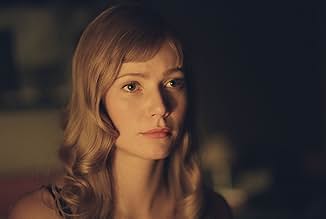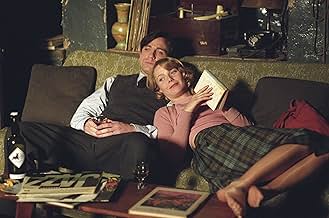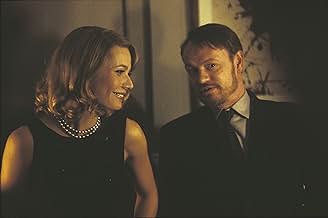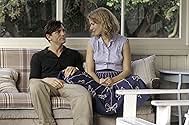VALUTAZIONE IMDb
6,3/10
11.487
LA TUA VALUTAZIONE
Aggiungi una trama nella tua linguaStory of the relationship between poets Edward James "Ted" Hughes and Sylvia Plath.Story of the relationship between poets Edward James "Ted" Hughes and Sylvia Plath.Story of the relationship between poets Edward James "Ted" Hughes and Sylvia Plath.
- Premi
- 1 vittoria in totale
Recensioni in evidenza
I am pretty familiar with Plath's story, and am also a keen fan of her work, which i think contributed to my hesitancy in seeing the film. I did not have high hopes for this film at all, and honestly, I have to say that I was pleasantly surprised.
My main criticisms:
I found it hard to get past the whole 'Oooh look it's Gwyneth Paltrow as Sylvia Plath'. Someone who isn't famous on a global scale would have been more credible.
The whole premise of the film hinges on the deep passionate relationship of Plath and Hughes, yet I never really felt convinced by it. The relationship came across as quite two dimensional, and even pretty one sided on the part of Paltrow/Plath. Instead of being portrayed as an emotionally fragile woman driven to the edge by Hughes' constant philandering and ultimate betrayal, Plath actually seemed to come across as being deeply insecure and neurotic, constantly suffering from extreme PMT, and overreacting every time she saw Hughes even talking to another woman, rather than having genuine reason to suspect his infidelity.
There were a couple of key dramatic moments (such as after they have made love for the first time, and when they are out in the boat together) that felt very hammy, so disrupted the momentum of the piece.
The score is just awful. Totally totally overwrought, over the top, too loud and too much of it. Plus, as Paltrow/Plath really starts to lose her mind there is an almost constant sound of howling wind in the backgroud. Again, OTT. Less definitely would have been more.
HOWEVER
Ok, I complained about Paltrow above, but she really did a great job. She really is a very talented actress, and it is a shame the whole celebrity thing gets in the way. She was particularly fine in the latter stages of the film, and the sad descent into loneliness and irreversible depression was very well judged.
Likewise, Daniel Craig was very enigmatic, although I wonder whether the one sidedness of the relationship as mentioned above may have come from him.
As a whole the film was very sympathetic, and showed how hard it must have been for Hughes to live with Plath. It doesn't justify his behaviour but rather tries to show an understanding. It also evokes a sense of a time when poets were considered important.
This film stayed with me for some days after watching it, and I would recommend it. It is somewhat uneven in pace and direction, but I think Christine Jeffs is a director with talent, although her inexperience showed. But above all, it renewed my interest in both Plath and Hughes.
7/10
My main criticisms:
I found it hard to get past the whole 'Oooh look it's Gwyneth Paltrow as Sylvia Plath'. Someone who isn't famous on a global scale would have been more credible.
The whole premise of the film hinges on the deep passionate relationship of Plath and Hughes, yet I never really felt convinced by it. The relationship came across as quite two dimensional, and even pretty one sided on the part of Paltrow/Plath. Instead of being portrayed as an emotionally fragile woman driven to the edge by Hughes' constant philandering and ultimate betrayal, Plath actually seemed to come across as being deeply insecure and neurotic, constantly suffering from extreme PMT, and overreacting every time she saw Hughes even talking to another woman, rather than having genuine reason to suspect his infidelity.
There were a couple of key dramatic moments (such as after they have made love for the first time, and when they are out in the boat together) that felt very hammy, so disrupted the momentum of the piece.
The score is just awful. Totally totally overwrought, over the top, too loud and too much of it. Plus, as Paltrow/Plath really starts to lose her mind there is an almost constant sound of howling wind in the backgroud. Again, OTT. Less definitely would have been more.
HOWEVER
Ok, I complained about Paltrow above, but she really did a great job. She really is a very talented actress, and it is a shame the whole celebrity thing gets in the way. She was particularly fine in the latter stages of the film, and the sad descent into loneliness and irreversible depression was very well judged.
Likewise, Daniel Craig was very enigmatic, although I wonder whether the one sidedness of the relationship as mentioned above may have come from him.
As a whole the film was very sympathetic, and showed how hard it must have been for Hughes to live with Plath. It doesn't justify his behaviour but rather tries to show an understanding. It also evokes a sense of a time when poets were considered important.
This film stayed with me for some days after watching it, and I would recommend it. It is somewhat uneven in pace and direction, but I think Christine Jeffs is a director with talent, although her inexperience showed. But above all, it renewed my interest in both Plath and Hughes.
7/10
There is a certain type of undergraduate who sees Sylvia Plath as the victim-heroine of a period that lionized talented men but had no place for women of similar gifts, and fortunately this film does not pander to them. Poets rarely receive lavish acclaim or wealth during their lifetimes, and hers was at least equal to her talent and irrespective of her gender. Any reasonably critical reader of her autobiographical novel The Bell Jar can see evidence of serious mental illness, which in Plath's case went largely untreated, and this film chooses to focus more on that aspect of her life than on anti-feminist conspiracy theories. However, the film comes up short of fully showing Plath as the highly complex and contradictory person her contemporaries knew: sexy, seductive yet so harsh and venal in her judgments of men (especially her husband and her father) as to seem man-hating; also manipulative and vain and yet so insecure that she went long periods without writing. She was likely bi-polar and could on occasion be described as downright monstrous, yet the film hollywoodizes Plath into a more conventional 'troubled' melodrama heroine, rather than delving deeper into the brutal reality of the day-to-day life of someone with significant mental illness. This is surprising given that director Christine Jeffs' earlier film on mental illness, Rain, was unstintingly honest. Plath's well known life history is covered in straightforward biopic narrative: her close-distant, love-hate yo-yo relationship with her mother; her famous first suicide attempt and the subsequent year spent in a sanatorium that was the basis for The Bell Jar; her rocky marriage to British poet Ted Hughes that ended because of his infidelity; her prolific period as a celebrated poet and her eventual death by suicide while still young.
I should point out that I thought the cinematography and production design were wonderful. The excellent period look is established by bleeding out bright color from every scene while giving it an amber tint like old photographs. The sets were almost hyper-realistic - cluttered, dim and claustrophobic with none of the romanticized shininess that Hollywood often lavishes on period dramas.
I should point out that I thought the cinematography and production design were wonderful. The excellent period look is established by bleeding out bright color from every scene while giving it an amber tint like old photographs. The sets were almost hyper-realistic - cluttered, dim and claustrophobic with none of the romanticized shininess that Hollywood often lavishes on period dramas.
What is it about an artist dying young - particularly if it is at his or her own hands - that strikes such a deep chord in so many of us? Is it the fact that this rare and special person achieves a kind of mastery of fate at the last moment, a perfect conclusion to this messy business of life that we mere mortals can never hope to attain? Could it be that this early death is just one more instance of an artist taking the elements of raw reality and transforming them into something stylized, transcendent and meaningful for the rest of us to brood over and contemplate? When poet and novelist Sylvia Plath committed suicide in 1963, she became the archetype of the tortured artist - particularly for sensitive young people who came to romanticize her end and her suffering in ways that lifted her and her work to iconic status.
The biopic, entitled simply 'Sylvia,' gets the 'tortured' part pretty much right, but has considerably less success with the 'artist.'
The film focuses mainly on the tumultuous relationship between Plath and her husband of eight years, famed poet Ted Hughes. The story begins in 1956 with their love-at-first-sight meeting when they were both students at Cambridge University. The film moves quickly through the years, showing how, after a short period of relative marital bliss, Ted's philandering began to take its toll on the relationship. As portrayed in the movie, Sylvia, despite her notable talent, is a mass of neuroses and insecurities, always toiling in the shadows of her (initially at least) much more well known and commercially successful husband. But her feelings of inadequacy and jealousy over Ted's infidelities cannot, in and of themselves, entirely account for her paranoia, her outbursts of anger and her suicidal tendencies. Those resulted mainly from the clinical depression that tormented the woman from the time of her father's death early in her childhood to her own tragic end. The movie sidesteps the electroshock therapy Plath underwent at various times in her life (though it very subtly hints at them), yet the film still manages to convey just how great a victim she was of this disease she could not overcome.
Thanks to John Brownlow's rather singlemindedly depressing screenplay, there's a tremendous feeling of sadness hovering over the film. Director Christine Jeffs brings a raw intensity to many of the confrontation scenes involving the pain-wracked, benighted couple. As Sylvia and Ted, Gwyneth Paltrow and Daniel Craig give rich, moving and sensitive performances, and Michael Gambon leaves his mark as a sympathetic neighbor who tries but does not succeed at saving Sylvia.
If there is a flaw in 'Sylvia,' it is one common to films that attempt to portray the lives of artists, particularly writers. Although a scenarist can dramatize the details of an artist's life, it is virtually impossible for him to capture the richness and power of the art itself in the different medium of film. We never get the sense of how Sylvia either overcomes the difficulties of her life to succeed in her writing or how she uses those difficulties to enhance her art. What we do get is a few shots of Sylvia sitting in front of a typewriter, a comment or two about a book that has been or is soon to be published, a few references to critical reviews, and a smattering of voice-over recitations of Plath's poetry. What we don't get and what it is virtually impossible for film to capture is the essence of the writing itself. For this, one needs to return to the source material, the works that have lived on after the woman herself all these years. If the movie inspires new people to explore Sylvia Plath's writing, it will not have been in vain
The biopic, entitled simply 'Sylvia,' gets the 'tortured' part pretty much right, but has considerably less success with the 'artist.'
The film focuses mainly on the tumultuous relationship between Plath and her husband of eight years, famed poet Ted Hughes. The story begins in 1956 with their love-at-first-sight meeting when they were both students at Cambridge University. The film moves quickly through the years, showing how, after a short period of relative marital bliss, Ted's philandering began to take its toll on the relationship. As portrayed in the movie, Sylvia, despite her notable talent, is a mass of neuroses and insecurities, always toiling in the shadows of her (initially at least) much more well known and commercially successful husband. But her feelings of inadequacy and jealousy over Ted's infidelities cannot, in and of themselves, entirely account for her paranoia, her outbursts of anger and her suicidal tendencies. Those resulted mainly from the clinical depression that tormented the woman from the time of her father's death early in her childhood to her own tragic end. The movie sidesteps the electroshock therapy Plath underwent at various times in her life (though it very subtly hints at them), yet the film still manages to convey just how great a victim she was of this disease she could not overcome.
Thanks to John Brownlow's rather singlemindedly depressing screenplay, there's a tremendous feeling of sadness hovering over the film. Director Christine Jeffs brings a raw intensity to many of the confrontation scenes involving the pain-wracked, benighted couple. As Sylvia and Ted, Gwyneth Paltrow and Daniel Craig give rich, moving and sensitive performances, and Michael Gambon leaves his mark as a sympathetic neighbor who tries but does not succeed at saving Sylvia.
If there is a flaw in 'Sylvia,' it is one common to films that attempt to portray the lives of artists, particularly writers. Although a scenarist can dramatize the details of an artist's life, it is virtually impossible for him to capture the richness and power of the art itself in the different medium of film. We never get the sense of how Sylvia either overcomes the difficulties of her life to succeed in her writing or how she uses those difficulties to enhance her art. What we do get is a few shots of Sylvia sitting in front of a typewriter, a comment or two about a book that has been or is soon to be published, a few references to critical reviews, and a smattering of voice-over recitations of Plath's poetry. What we don't get and what it is virtually impossible for film to capture is the essence of the writing itself. For this, one needs to return to the source material, the works that have lived on after the woman herself all these years. If the movie inspires new people to explore Sylvia Plath's writing, it will not have been in vain
When I rented this movie, I thought it would be about Sylvia's entire life, or at least starting from her days at Smith College. I didn't realize that her marriage with Ted Hughes would be the entire storyline. I think this movie would've been better had they shown more about Plath's life BEFORE Ted Hughes. For people who don't really know much about Plath and her poetry, understanding her life before Hughes would've made the film much more substantial. The audience has to realize that Plath led a very, very hard mental life even before she met Hughes, and her ideas for her poetry and 'The Bell Jar' mostly originated from her bachelorette days. She never recovered from her depression as a young woman and it branched out still as she married Hughes. Without understanding Plath from the beginning hinders the audience from understanding Plath at all.
I feel like the movie only told half the story. Plath's mind was beautiful, colorful, and brilliant. It wasn't just about the jealousy, depression, and paranoia. Putting her works on the back burner really took away most of this movie. I would've liked to see more narration by Plath and giving us an insight into her mind, the way her unabridged journals do. However, I really enjoyed the dialogue of this movie; the lines were poetic and beautiful.
Unfortunately, I am still waiting for a better Sylvia Plath movie. I recommend people to read 'The Bell Jar' and 'Ariel' before or after seeing this movie though.
I feel like the movie only told half the story. Plath's mind was beautiful, colorful, and brilliant. It wasn't just about the jealousy, depression, and paranoia. Putting her works on the back burner really took away most of this movie. I would've liked to see more narration by Plath and giving us an insight into her mind, the way her unabridged journals do. However, I really enjoyed the dialogue of this movie; the lines were poetic and beautiful.
Unfortunately, I am still waiting for a better Sylvia Plath movie. I recommend people to read 'The Bell Jar' and 'Ariel' before or after seeing this movie though.
"Sylvia" is not quite just a slow, straightforward bio-pic of poet Sylvia Plath. While screenwriter John Brownlow has a long background in TV documentaries, director Christine Jeffs has previously made a young woman's mental disquiet dreamily visual in the superb New Zealand film "Rain."
She has her "Rain" cinematographer John Toon bathe the entire film in a nostalgia-tinged amber glow, like the extended flashbacks to the young lovers in the Australian film "Innocence." I think the point is to determinedly place Plath and her husband poet Ted Hughes into their specific time at the cusp before "The Feminine Mystique" put a name to Plath's frustrations and contradictions as a Fulbright scholar - experimental poet turned wife and mother who ultimately turned on herself. ("Mona Lisa's Smile" with Julia Roberts will evidently be dealing with a parallel time and place in a much more Hollywood interpretation.)
As played alternatively languid and aggressive by Gwyneth Paltrow and a Byronic Daniel Craig, they are an actively sensual couple, but notably not Bohemian. They are part of an intellectual but not counter-cultural set. While they are competing for editors' accolades and print space, she's setting her hair, arranging her pearls and cleaning house, like a proper Smith graduate of the time who is perfectly at home visiting her Boston mother (played by real-life mom Blythe Danner) and amidst the books of her late bee scholar father (My friend the PhD in English tells me that the original film title of "The Bee-Keeper's Daughter" would have been fraught with much more significance about Plath's obsessions.)
Hughes celebrates his first big break by asking her to marry him and kids follow one after the other; when they need money he looks to write a children's series for the BBC. Yes, she gets more and more difficult and paranoid, but he is having affairs (and another child) as he attracts more fawning women acolytes.
An earlier suicide effort is referenced a couple of times yet her increasingly heightened mental imbalance as shown here could be post-partum depressions or a Laingian response that insanity is the only rational response to an insane, unfair world. (The film does not seem to side with her loyalist cult which Margaret Atwood satirizes in "The Blind Assassin").
It is always difficult to show a writer at work, but I would have liked to hear more of her poetry than a few passing sentences.
Gabriel Yared's music is lovely and unsentimental.
She has her "Rain" cinematographer John Toon bathe the entire film in a nostalgia-tinged amber glow, like the extended flashbacks to the young lovers in the Australian film "Innocence." I think the point is to determinedly place Plath and her husband poet Ted Hughes into their specific time at the cusp before "The Feminine Mystique" put a name to Plath's frustrations and contradictions as a Fulbright scholar - experimental poet turned wife and mother who ultimately turned on herself. ("Mona Lisa's Smile" with Julia Roberts will evidently be dealing with a parallel time and place in a much more Hollywood interpretation.)
As played alternatively languid and aggressive by Gwyneth Paltrow and a Byronic Daniel Craig, they are an actively sensual couple, but notably not Bohemian. They are part of an intellectual but not counter-cultural set. While they are competing for editors' accolades and print space, she's setting her hair, arranging her pearls and cleaning house, like a proper Smith graduate of the time who is perfectly at home visiting her Boston mother (played by real-life mom Blythe Danner) and amidst the books of her late bee scholar father (My friend the PhD in English tells me that the original film title of "The Bee-Keeper's Daughter" would have been fraught with much more significance about Plath's obsessions.)
Hughes celebrates his first big break by asking her to marry him and kids follow one after the other; when they need money he looks to write a children's series for the BBC. Yes, she gets more and more difficult and paranoid, but he is having affairs (and another child) as he attracts more fawning women acolytes.
An earlier suicide effort is referenced a couple of times yet her increasingly heightened mental imbalance as shown here could be post-partum depressions or a Laingian response that insanity is the only rational response to an insane, unfair world. (The film does not seem to side with her loyalist cult which Margaret Atwood satirizes in "The Blind Assassin").
It is always difficult to show a writer at work, but I would have liked to hear more of her poetry than a few passing sentences.
Gabriel Yared's music is lovely and unsentimental.
Lo sapevi?
- QuizFrieda Hughes, Sylvia Plath's daughter and literary executor, didn't allow the producers to access to her mother's poetry. She also publicly denounced the project in a published poem of her own.
- BlooperWhen Ted and Sylvia are in bed together and she is discussing her suicide attempt, you can clearly see Daniel Craig's tattoo through the make up on his shoulder and Gwyneth Paltrow's hair net to which her wig is attached.
- Citazioni
Sylvia: [to Ted, after making love] We're not even two people. Even before we met, we were just these two halves, walking around with big gaping holes in the shape like the other person. And when we found each other we were finally whole. And then it was as if we couldn't stand being happy so we ripped ourselves in half again.
I più visti
Accedi per valutare e creare un elenco di titoli salvati per ottenere consigli personalizzati
- How long is Sylvia?Powered by Alexa
Dettagli
- Data di uscita
- Paese di origine
- Lingua
- Celebre anche come
- Ted and Sylvia
- Luoghi delle riprese
- Aziende produttrici
- Vedi altri crediti dell’azienda su IMDbPro
Botteghino
- Budget
- 7.000.000 £ (previsto)
- Lordo Stati Uniti e Canada
- 1.315.498 USD
- Fine settimana di apertura Stati Uniti e Canada
- 58.940 USD
- 19 ott 2003
- Lordo in tutto il mondo
- 2.917.393 USD
- Tempo di esecuzione1 ora 50 minuti
- Colore
- Mix di suoni
- Proporzioni
- 2.35 : 1
Contribuisci a questa pagina
Suggerisci una modifica o aggiungi i contenuti mancanti




































